How the World Transplant Games: gave Watford man a post-op goal
- Published
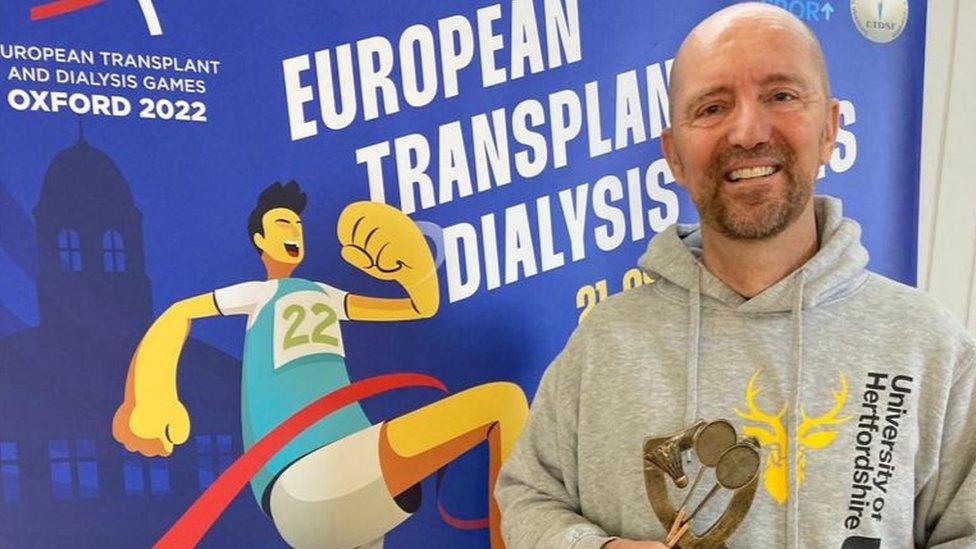
After a double kidney and liver transplant, Andy Taylor has been selected for the World Transplant Games in Australia, where he will represent Great Britain and Northern Ireland
Seven years after a kidney and liver transplant, Andy Taylor is heading to the World Transplant Games. With more than 7,000 people currently on the transplant list, he wants more people to have "those conversations" about organ donation with loved ones.
As the son of athlete Don G Taylor - the former British 10,000m record holder - Andy Taylor said sport had been "a narrative" throughout his life. He had grown up in his father's sports centre and regularly played racket sports.
But in 2014, he was gaunt and had little energy. He found just getting up a step into his house was an effort and remembers once bending down to do up a shoelace and not being able to get back up because he had no muscle mass.
The 57-year-old from Watford has Polycystic Kidney Disease (PKD), external, a hereditary condition which causes fluid-filled cysts to grow in the kidneys. It can cause them to get bigger and eventually fail.
He had been warned in 2012 that he would need a kidney transplant in about two years time.
"I knew it was coming, but it was still a bit of a shock," he said.
"But gradually my kidneys got so big that it looked like I was pregnant."
The plan in 2014 was to have a double nephrectomy - where the kidneys are removed - and then recover for three months on dialysis before a kidney from his best friend, who had already been found to be a suitable donor, was transplanted.
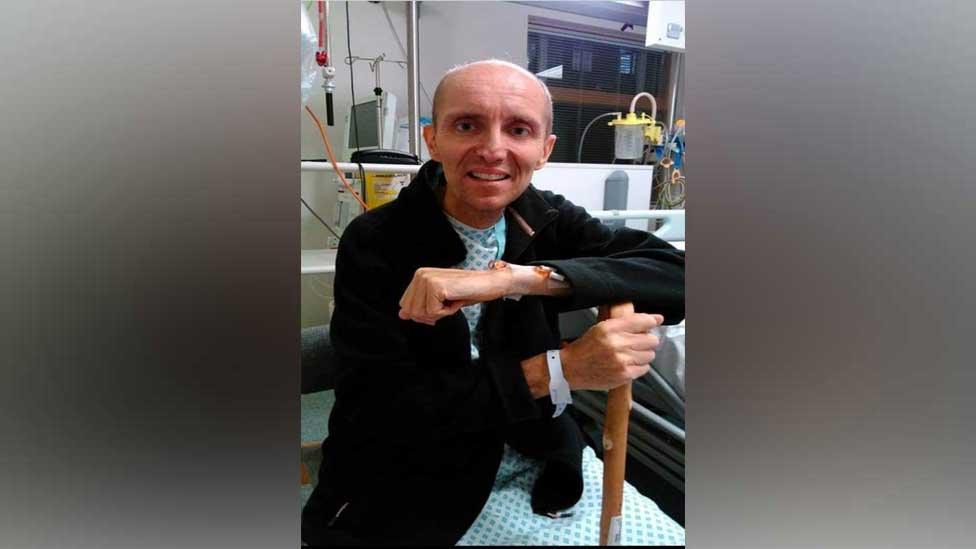
After a double nephrectomy in 2014, Andy said he had "no kidney function at all and no plan - literally overnight"
But then his liver was also found to be polycystic, so while his kidneys were still removed, he now had to wait for both a liver and a kidney from the same person, which reduced the chance of getting a transplant.
"After the nephrectomy, I had no kidney function at all and no plan - literally overnight. This was quite a hit mentally," he said.
He adds that the next two years on the transplant list were "a challenge".
His liver grew to fill the gap left by his kidneys and began to encroach on his other organs, which affected his eating and breathing.
On dialysis three times a week for five hours at a time, he limited his fluid intake to just 500ml between dialysis sessions.
"They say dialysis is equivalent to deep sea diving in the amount of energy it takes out of your body, so I would sleep for the five hours and then sleep in the afternoon," he said.
"On the way home after my first session I cried at the thought of what was ahead."
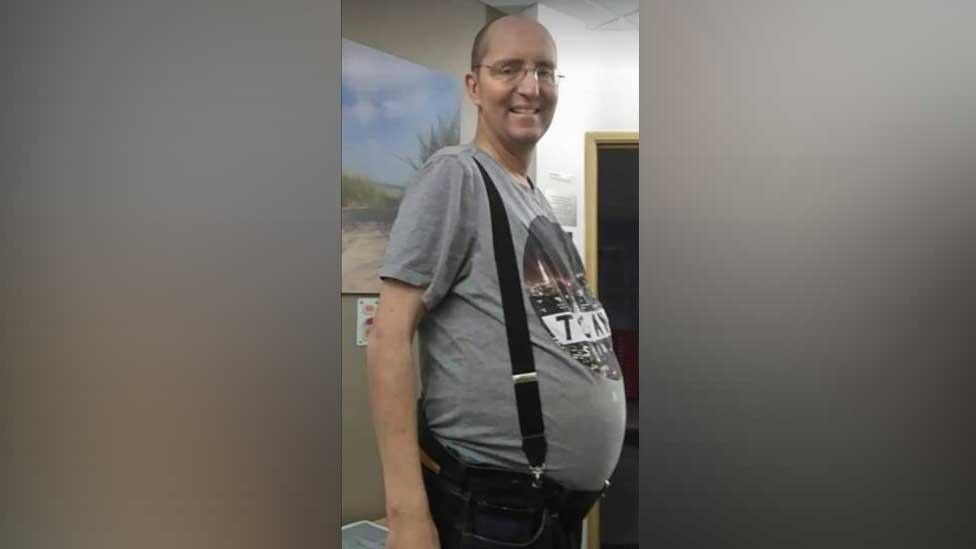
Pictured just before his transplant in January 2016, Andy's liver had grown to fill the gap his kidneys had left
In Andy's case, his liver was large but still functioning, so he would be moved down the list if somebody was in greater need.
He said that while "physically you manage" during the wait for a donor, in reality he was "just ticking over".
"You mentally press pause on life - it's hard going, so you are very excited to get the call."
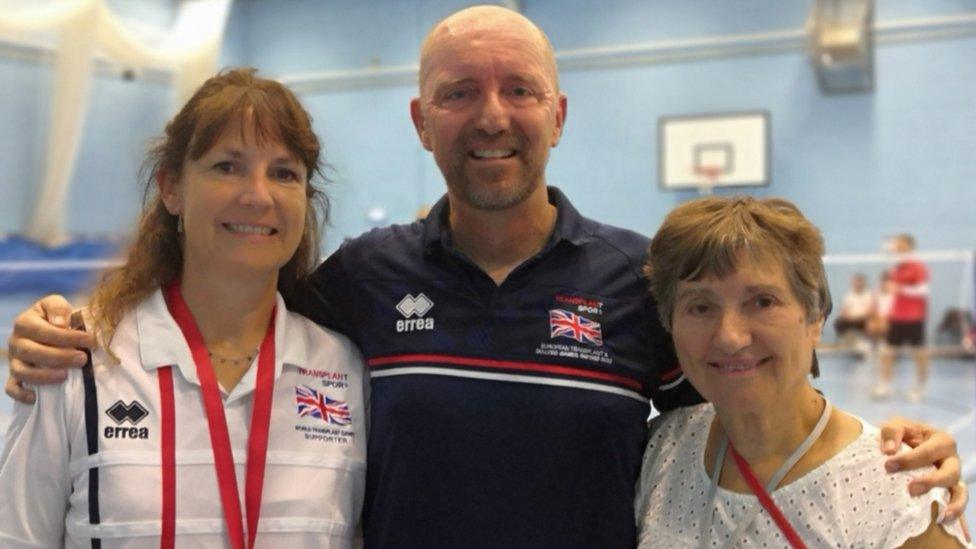
Andy said waiting for a transplant was also a challenge for his wife Kate (left) who "steered the ship during those difficult years" and his mother (right) and two children
Andy got that call at 04:00 GMT one January morning in 2016 and left straight away for King's College Hospital in London, where, after a 10-hour operation, he stayed for 10 weeks.
"When I woke up I was in excruciating pain and I couldn't move, but I was alive," he said.
Towards the end of his stay, his sporting instinct began to kick in and he began to walk short distances in order to be discharged.
"I could walk to the toilet and, ever the sportsman, I set targets for myself - could I walk down the corridor etc?" he said.
But it was the Transplant Games that gave him a goal.
"It was always my intention to get back to sport," he said.
"Initially I just wanted to walk in the countryside and see some colours rather than the bland hospital walls.
"But sport is a narrative through my life... part of my life I needed to get back to in order to have some sort of normality."
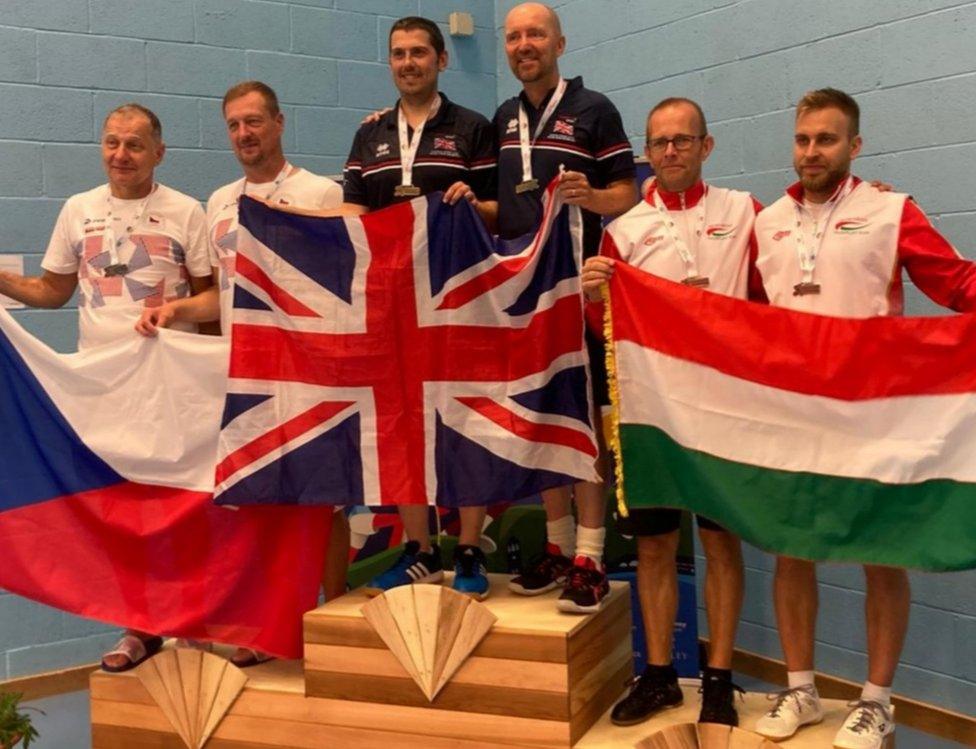
Andy Taylor and his partner won the Men's Doubles Badminton at the European Transplant Games last year
The following year, in 2017, he entered a Park Run and thought "right I'm ready now".
"I'd heard of the British Transplant Games and as a transplant goal had been to play badminton again, I went to the event in Newport in 2019 and had an amazing weekend," he said.
He played singles in table tennis, where his team won silver, and doubles in badminton where he won gold.
'Strange juxtaposition'
Andy said his table tennis team of four "represented pretty much all the organs", because his team mates included people who had had a heart transplant and a double lung transplant.
"It wasn't transplant top trumps but everyone has a story - it is a really uplifting event," he said.
"Everybody there gets it. Everyone has been through some kind of journey and everybody there seemed to be some kind of superhero.
"At one point you're choking back tears and then the next minute you're trying to beat them at table tennis - it's a strange juxtaposition."
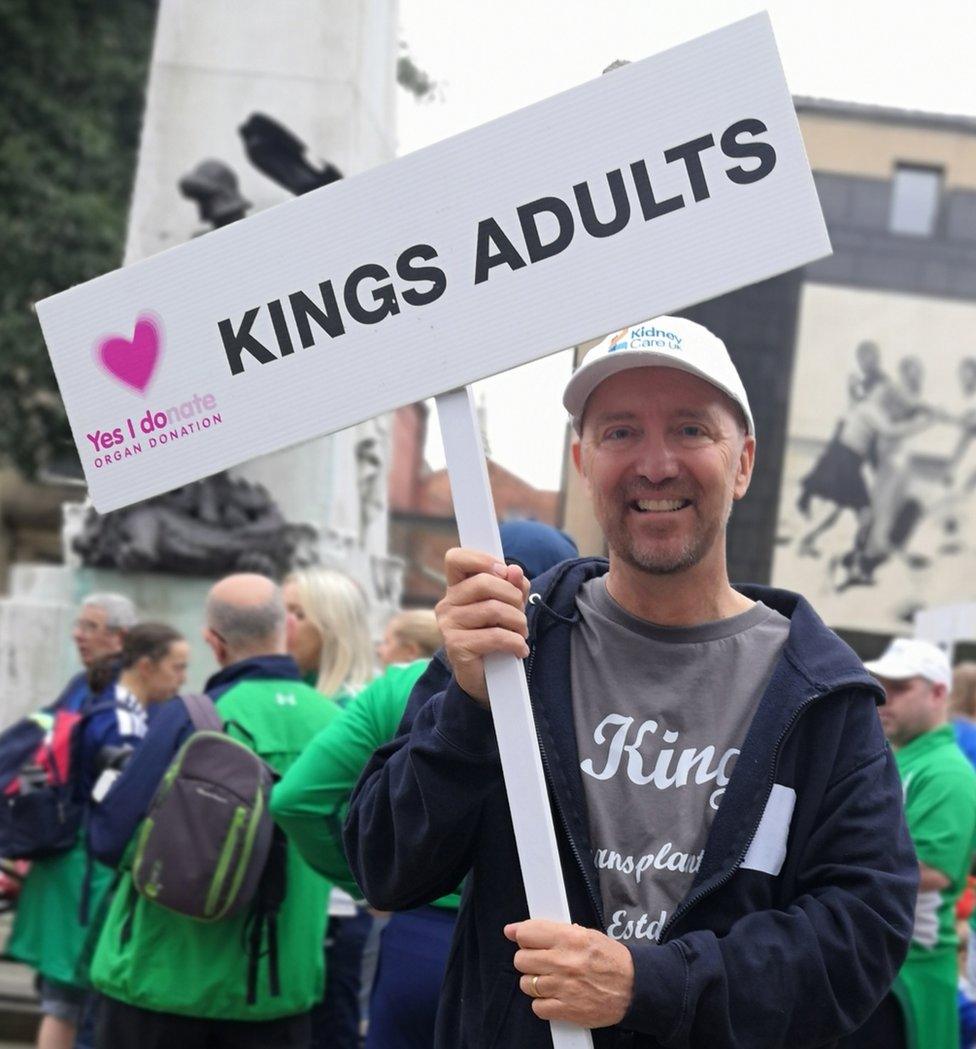
Andy carried the King's College Hospital adults team sign at the opening ceremony for the British Transplant Games in Leeds in July 2022
Covid halted plans to keep competing because, with all competitors immuno-compromised, events did not return until 2022, when he won two golds at the British event and won again at the Europeans in Oxford.
He is now going to represent Great Britain and Northern Ireland in both sports at the World Transplant Games in Perth, Australia, which start on 15 April.
First held 1978 in Portsmouth, the seven-day event attracts 2,500 participants from more than 60 nations and is described as the "world's largest awareness event for the gift of life".
"The games let us do things that represent recovery and to represent my country, I'm over the moon," Andy said.
"I'm excited for the opportunity, honoured to be chosen and humbled by my anonymous donor's decision to donate organs."
He said the games celebrate the "life-changing, life-saving power of organ donation" and "promote the benefits of post-transplant sport and exercise".
"They are a great recovery goal for someone who has been through the process and if we can persuade more people to sign up we can shorten the wait," he said.
"I may not win a gold in Perth but I'd like to get a medal for promoting organ donation."
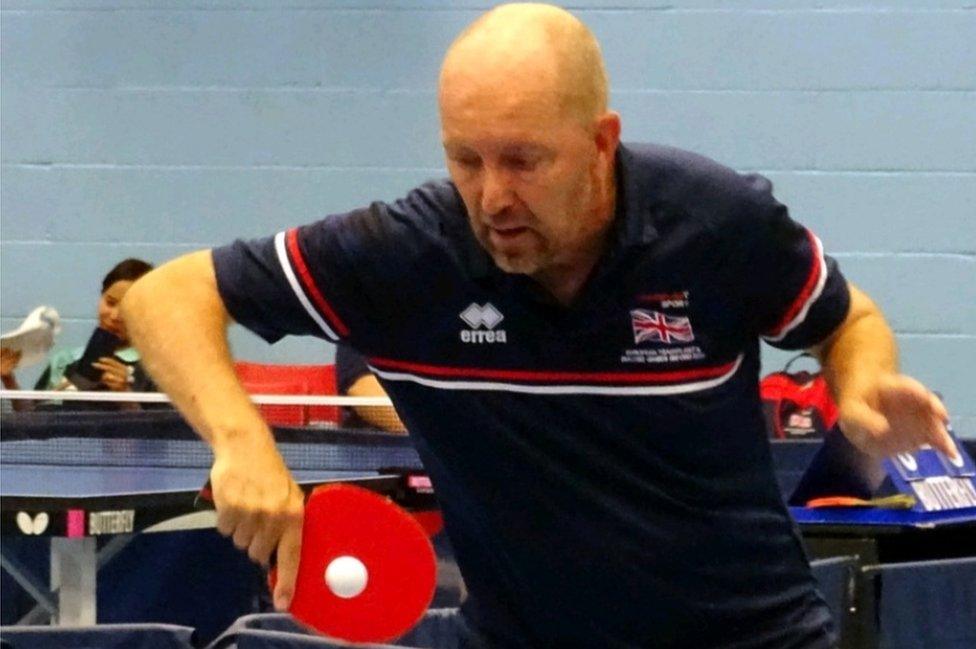
There was another gold for Andy in the table tennis event at the European Transplant Games in Oxford in August 2022
Organ Donation UK said currently more than 7,000 people are waiting for a transplant, including about 200 children.
The law is that unless a person has opted out, or told their family they do not wish to donate, it is assumed that they would support organ donation.
But families are always meant to be consulted and if they refuse to support the donation, it will not go ahead.
The organisation said families are more likely to be supportive if they know it is what their loved one wanted so it encourages everyone to register their support for donation, external.
An NHS blood and transplant spokesman said the Transplant Games "highlight and celebrate what is possible thanks to the amazing gift of organ donation".
"Over 50,000 people in the UK are alive today thanks to the generosity of others who have agreed to donate organs either whilst alive or after their death," he said.
"It is thanks to those donors, that those people are able to carry on living their lives, spending precious time with their families and making a difference in the world."
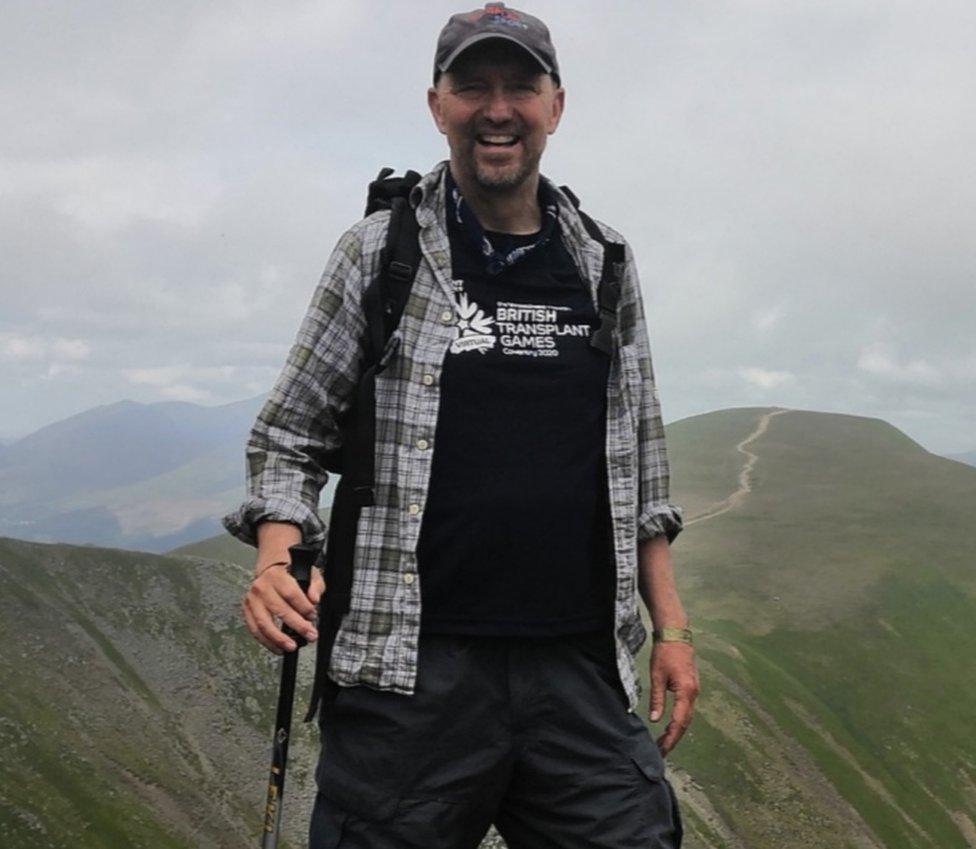
Six years after his kidneys were removed, Andy walked to the summit of Helvellyn in the Lake District last June
Andy said that his donor "transformed my life".
"I can't put into words how grateful I am... it all comes back to the NHS and my donor and their family and the decision they made in a traumatic situation," he said.
"My best friend once said a transplant is a magical combination of love and science and this is an opportunity for me to say 'have those conversations with your loved ones'.
"If relatives can say 'it's what they would have wanted', it gives them some solace that they can make that decision with full knowledge that it was their wish.
"They are passing on part of their loved ones' lives to someone else."

Find BBC News: East of England on Facebook, external, Instagram, external and Twitter, external. If you have a story suggestion email eastofenglandnews@bbc.co.uk, external